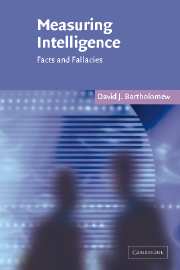Book contents
- Frontmatter
- Contents
- List of figures
- Preface
- Acknowledgement
- 1 The great intelligence debate: science or ideology?
- 2 Origins
- 3 The end of IQ?
- 4 First steps to g
- 5 Secons steps to g
- 6 Extracting g
- 7 Factor analysis or principal components analysis?
- 8 One intelligence or many?
- 9 The Bell Curve: facts, fallacies and speculations
- 10 What is g?
- 11 Are some groups more intelligent than others?
- 12 Is intelligence inherited?
- 13 Facts and fallacies
- Notes
- References
- Index
1 - The great intelligence debate: science or ideology?
Published online by Cambridge University Press: 22 September 2009
- Frontmatter
- Contents
- List of figures
- Preface
- Acknowledgement
- 1 The great intelligence debate: science or ideology?
- 2 Origins
- 3 The end of IQ?
- 4 First steps to g
- 5 Secons steps to g
- 6 Extracting g
- 7 Factor analysis or principal components analysis?
- 8 One intelligence or many?
- 9 The Bell Curve: facts, fallacies and speculations
- 10 What is g?
- 11 Are some groups more intelligent than others?
- 12 Is intelligence inherited?
- 13 Facts and fallacies
- Notes
- References
- Index
Summary
The noise of battle
Almost everyone uses the word intelligence but it is one of those Humpty Dumpty words whose meaning is so elastic that it can cover virtually anything we choose. Lack of clarity does not make for rational discussion, but that simple fact is not enough to account for the ferocity with which the intelligence debate is often conducted. Every so often a spark ignites the dry tinder and the arguments flare up again. One of the most spectacular recent displays was triggered by the publication of The Bell Curve in 1994 by Herrnstein and Murray. This book created quite a stir at the time and it has now become a point of reference for current exchanges – even if the temperatures are lower. It gave a new lease of life to a controversy with a long history going back at least to Sir Francis Galton towards the end of the nineteenth century.
On the face of it, the book appeared to be a straightforward, thorough and clear exposition of a body of social science research. Its object was to explore how many of the problems affecting contemporary American society could be explained by variation in IQ (the intelligence quotient – a measure of intelligence) among individuals. It is clear from the flood of literature which followed in its wake, mainly highly critical, that there was much more to this than met the eye.
- Type
- Chapter
- Information
- Measuring IntelligenceFacts and Fallacies, pp. 1 - 13Publisher: Cambridge University PressPrint publication year: 2004



